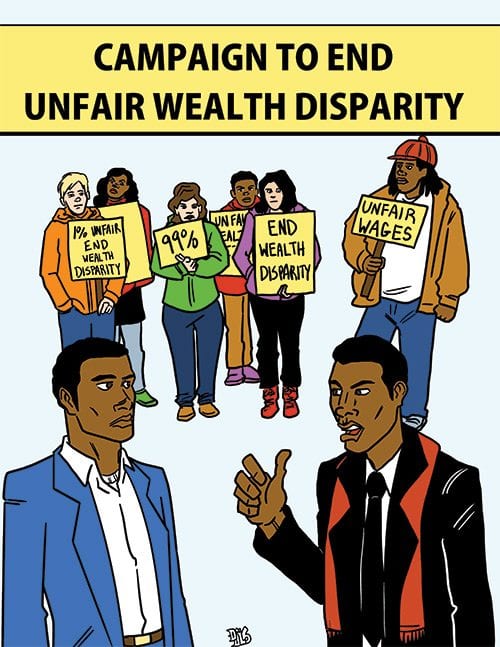
Zealous patriots are quick to boast that the “U.S.A. is Number One.” This assertion usually is a compliment, but sometimes it can actually be an embarrassment. As the world’s greatest industrial nation, it is not a good thing for America also to have the highest rate of income inequality in the developed world. President Barack Obama paid considerable attention to that problem, but it remains unresolved. Income disparity now has become a major issue in the campaign for president, and voters will have to decide whether Bernie Sanders or Hillary Clinton offer the most promising solution.
According to the Economic Policy Institute, wage stagnation has been underway in America since 1979. As the cost of living increased, the working class was pushed into poverty and many Americans were dislodged from their middle class status. While the lives of lower income families were decimated, the gross domestic product (GDP) actually grew 149 percent since 1979 and the productivity of labor increased by 64 percent.
While workers’ wages stagnated, declined, or grew an average of only 10.9 percent from 1978 to 2014, the top CEO compensation, adjusted for inflation, blossomed by 997 percent. The CEO salaries of the 350 top U.S. firms are now three times more than 20 years ago. Back in 1965, the CEO earned only about 20 times the average salary of the workers. By 2014 that ratio had leaped to 303 times.
As might be expected, the wage stagnation has been especially damaging to black family incomes. In 2014, median black wages were only 75 percent of the wages for whites. Hispanic median wages were at only 70 percent.
Lower income and a higher cost of living create poverty. The higher wages to CEOs also led to substantial salary upgrades at lower executive levels. The higher salaries for business executives pushed up consumer prices. The U.S. Department of Labor maintains a consumer price index (CPI) to track the cost of living. In 1965 the average CPI was 31.5; by 2015 the CPI had ballooned to 237. The cost of living has grown in that period by a factor of 7.5. With stagnating or declining wages, the consequences were an unfortunate economic decline for working class families.
Well-managed family income is the basic ingredient for the development of wealth. A recent report entitled “The Color of Wealth in Boston” that was produced by the Federal Reserve Bank demonstrates that the lower incomes for blacks have impaired any chance of building wealth. The report stated that for every $1.00 of liquid assets held by white households, U.S. blacks have only 2 cents and Caribbean blacks have only 14 cents. The median wealth for white households was $247,500 compared with zero for blacks.
The enormity of the wealth disparity suggests that a simplistic solution will not be effective. All Clinton can do is repeat what Obama tried with minimal success. Perhaps Sanders is right; it will take a revolution much like the unrelenting Civil Rights Movement, but with novel strategies. The wealthiest 1 percent possesses 40 percent of the wealth while the bottom 80 percent own only 7 percent. It is likely that the plutocrats would vigorously oppose any progressive tax proposal that is designed to benefit the financially less fortunate.
A disappointing aspect of the problem is that taxpayers’ funds were used to bail out Wall Street from the crash that preceded the Great Recession, even though Wall Street was significantly responsible for the crisis. Yet, since the recovery period from 2009, an estimated 95 percent of the economic gains have gone to the top 1 percent. The general public is owed a better rate of return.
Nonetheless, conservatives would undoubtedly organize to prevent the government from ameliorating the nations’ unfair wealth disparity. African Americans must, therefore, vote for the candidate for president who is most likely to mobilize a citizen’s crusade for equity. The election returns from New Hampshire indicate that Bernie Sanders is that candidate.






